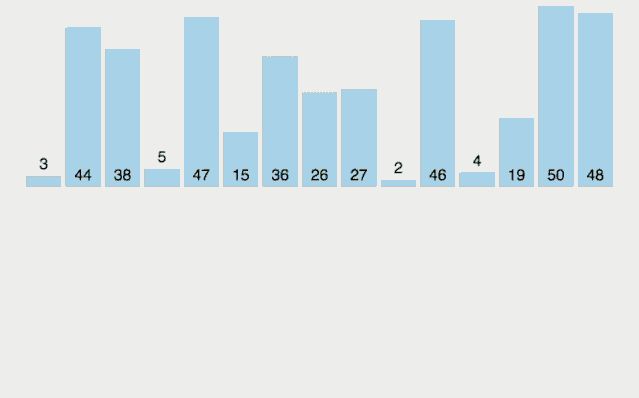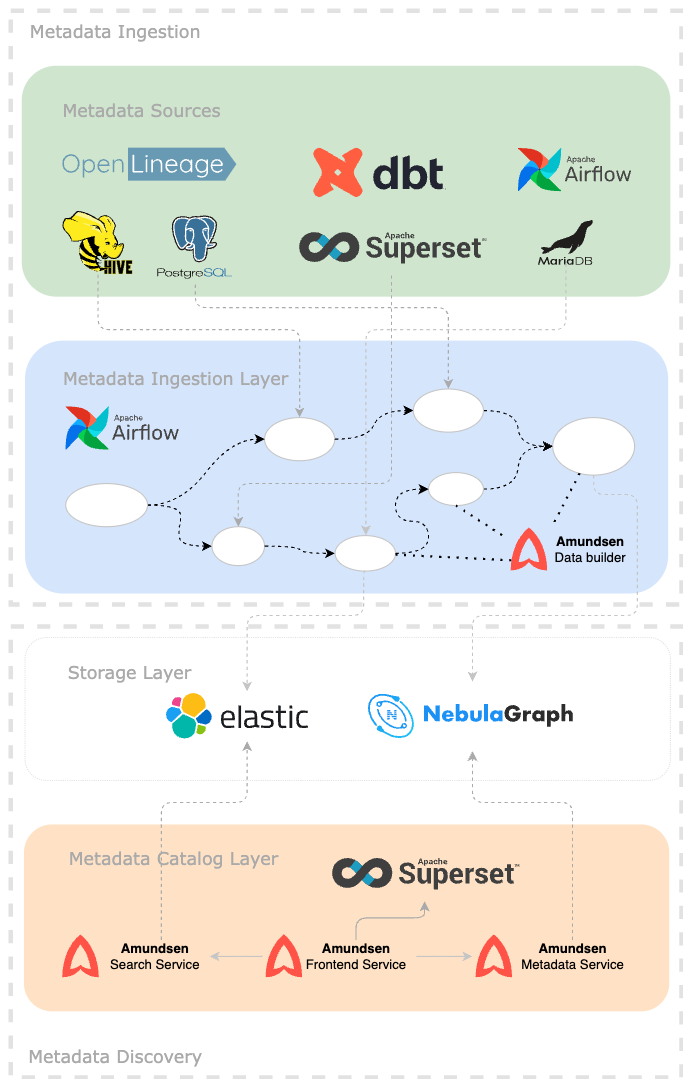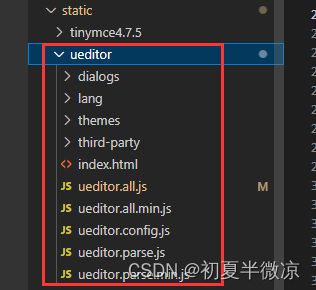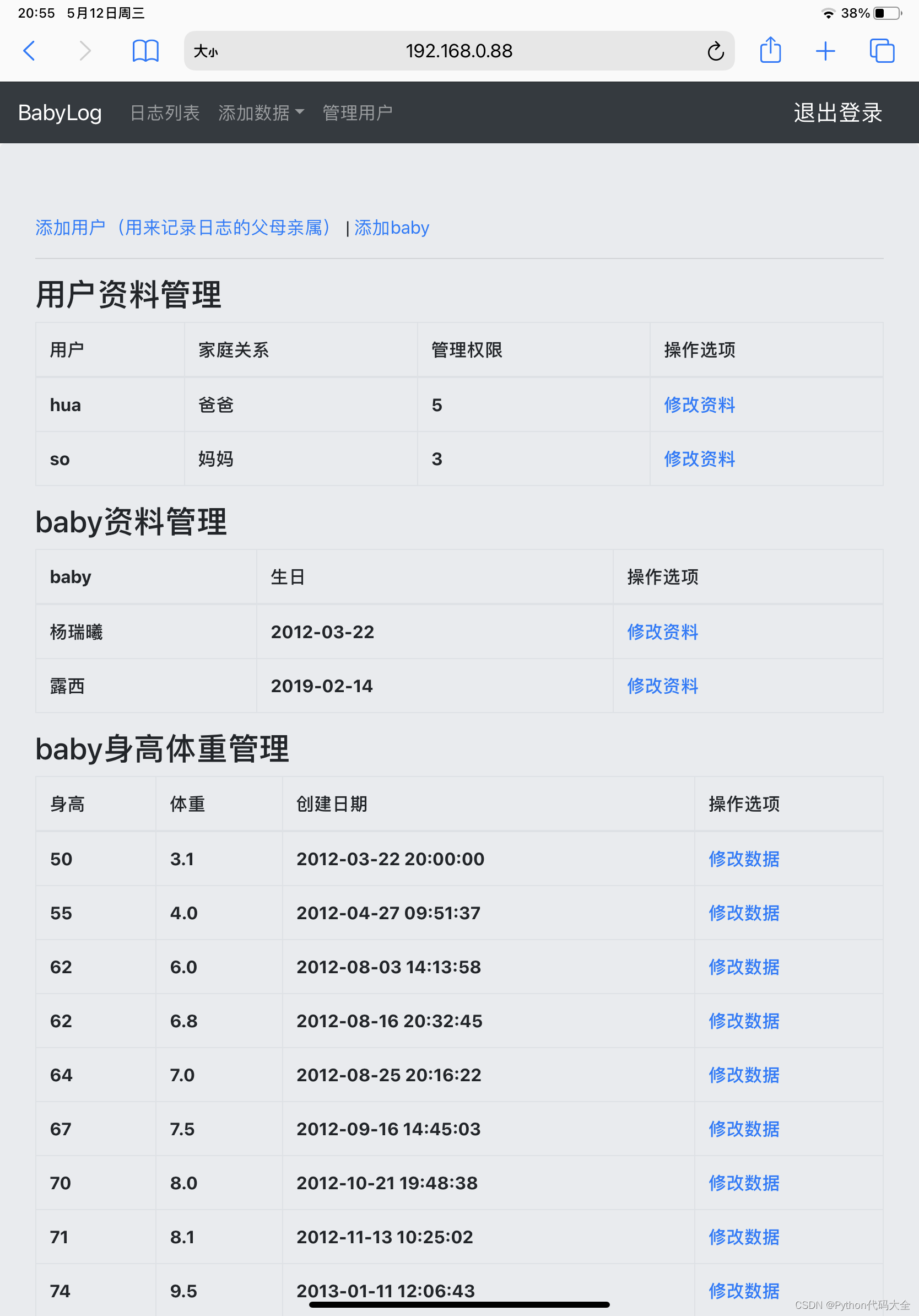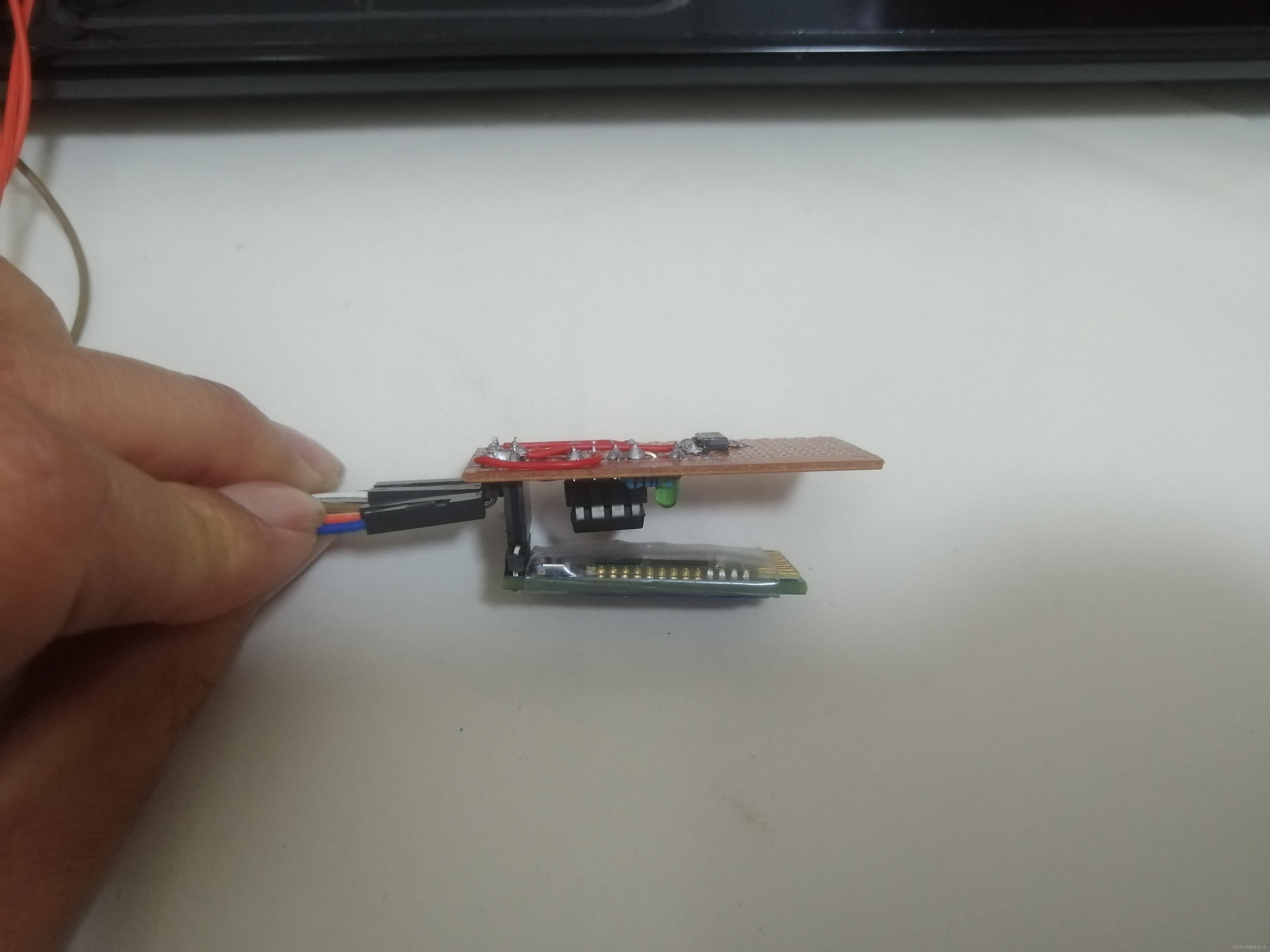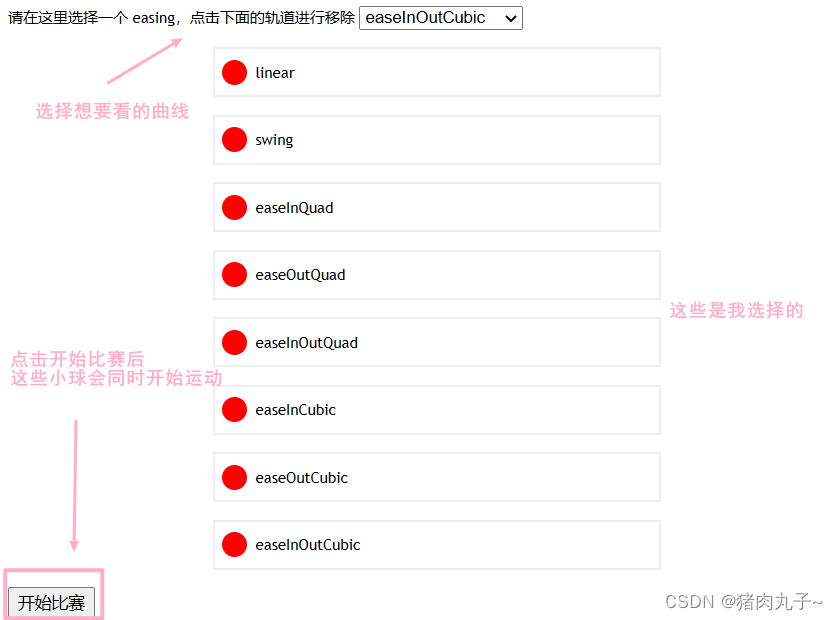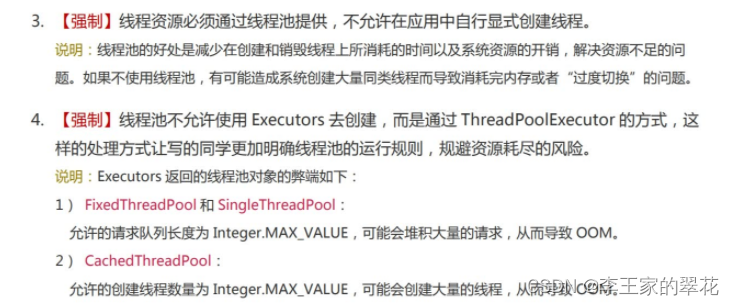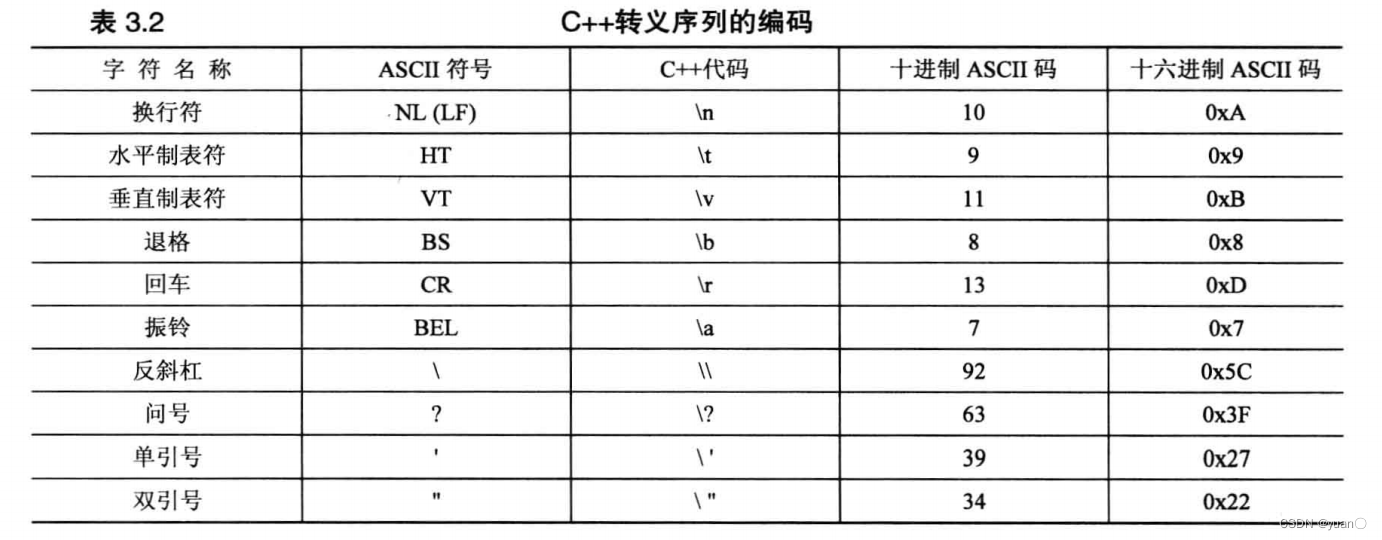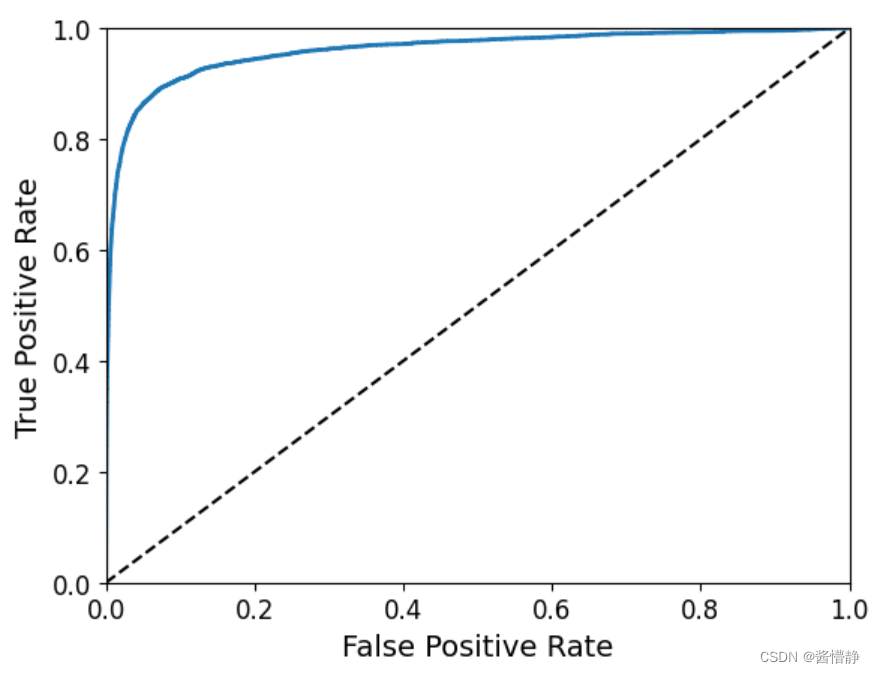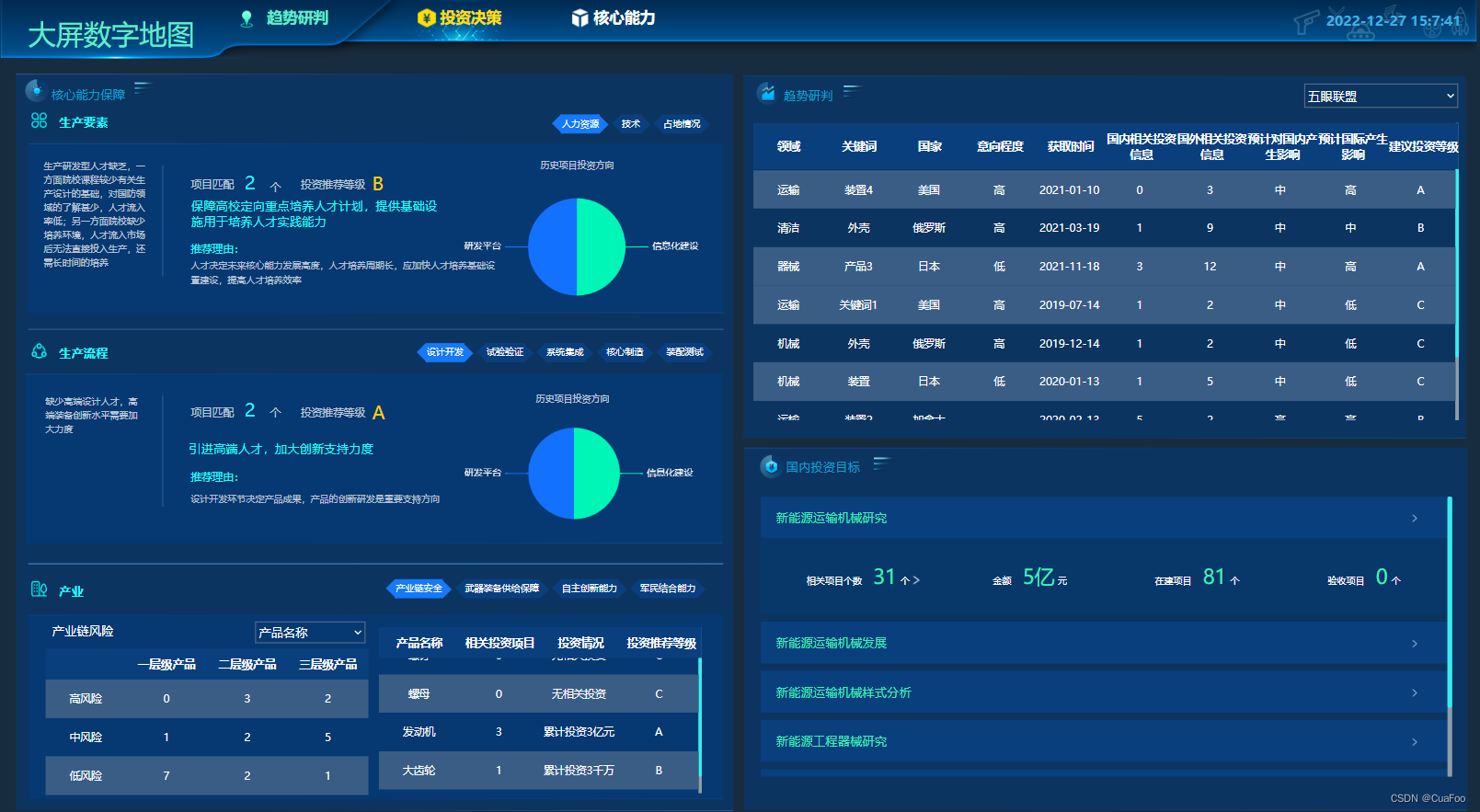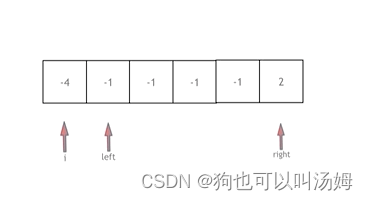一、理解HTTP无状态
1.1、理解http无状态
http无状态是指协议对于用户身份、用户状态、用户权限、交互场景等没有记忆能力。简单讲就是不能识别用户。
1.2、http无状态的优点:
可以更快地处理大量的事务,确保协议的可伸缩性,减少服务器的 CPU 及内存资源的消耗。
1.3、因为http无状态所以引出本文内容Cookie。
1.4、Cookie往往存储Token等用来记录客户端用户信息,本文仅介绍Cookie相关。
二、理解Cookie:
2.1、Cookie 以名/值对形式存储,举例:
username=snowball
2.2、cookie 存储在客户端。cookie有大小限制,大小一般是4k,超过这个限制,cookie中无法存储该数据。
2.3、cookie数据是指某些网站为了辨别用户身份或实现业务能力,储存在用户本地终端上的数据(通常经过加密),由用户客户端计算机暂时或永久保存的信息。
2.4、截图

三、Cookie属性:
3.1、Name/Value:设置Cookie的名称及相对应的值。
3.2、Expires属性:设置Cookie的生存期。
有两种存储类型的Cookie:会话性与持久性。
Expires属性缺省时,为会话性Cookie,仅保存在客户端内存中,并在用户关闭浏览器时失效;
持久性Cookie会保存在用户的硬盘中,直至生存期到或用户直接在网页中单击“注销”等按钮结束会话时才会失效 。
3.3、Path属性:定义了Web站点上可以访问该Cookie的目录。
3.4、Domain属性:指定了可以访问该 Cookie 的 Web 站点或域。Cookie 机制并未遵循严格的同源策略,允许一个子域可以设置或获取其父域的 Cookie。当需要实现单点登录方案时,Cookie 的上述特性非常有用,然而也增加了 Cookie受攻击的危险,比如攻击者可以借此发动会话定置攻击。因而,浏览器禁止在Domain属性中设置.org、.com 等通用顶级域名、以及在国家及地区顶级域下注册的二级域名,以减小攻击发生的范围。
3.5、Secure属性:指定是否使用HTTPS安全协议发送Cookie。使用HTTPS安全协议,可以保护Cookie在浏览器和Web服务器间的传输过程中不被窃取和篡改。该方法也可用于Web站点的身份鉴别,即在HTTPS的连接建立阶段,浏览器会检查Web网站的SSL证书的有效性。但是基于兼容性的原因(比如有些网站使用自签署的证书)在检测到SSL证书无效时,浏览器并不会立即终止用户的连接请求,而是显示安全风险信息,用户仍可以选择继续访问该站点。由于许多用户缺乏安全意识,因而仍可能连接到Pharming攻击所伪造的网站。
3.6、HTTPOnly 属性 :用于防止客户端脚本通过document.cookie属性访问Cookie,有助于保护Cookie不被跨站脚本攻击窃取或篡改。但是,HTTPOnly的应用仍存在局限性,一些浏览器可以阻止客户端脚本对Cookie的读操作,但允许写操作;此外大多数浏览器仍允许通过XMLHTTP对象读取HTTP响应中的Set-Cookie头。
四、cookie基础用法:
4.1、创建cookie
document.cookie = "username=snowball"
4.2、读取cookie
document.cookie

注意:设置了 HttpOnly 标志的 Cookie 无法访问
4.3、修改cookie
document.cookie = "username=snowwin"

4.4、删除cookie
document.cookie = "username="
4.5、创建方法,设置cookie
function setCookie(cname,cvalue,exdays)
{
var d = new Date();
d.setTime(d.getTime()+(exdays*24*60*60*1000));
var expires = "expires="+d.toGMTString();
document.cookie = cname + "=" + cvalue + "; " + expires;
}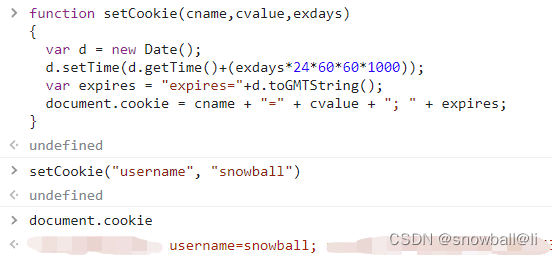
4.6、使用方法,获取cookie
function getCookie(cname)
{
var name = cname + "=";
var ca = document.cookie.split(';');
for(var i=0; i<ca.length; i++)
{
var c = ca[i].trim();
if (c.indexOf(name)==0) return c.substring(name.length,c.length);
}
return "";
} 
4.7、设置secure字段
标记为 secure 的 Cookie 只应通过被 Https 协议加密过的请求发送给服务端。(通过 https 创建的 Cookie 只能通过 Https 请求将 Cookie 携带到服务器,通过 http 无法拿到 Cookie)
document.cookie = 'testname=snowball;Secure=true'


五、过程记录
5.1、根据同源策略,cookie是区分端口的。
但是浏览器实现来说,“cookie区分域,而不区分端口。
也就是说,同一个ip下的多个端口下的cookie是共享的!
也就是本地开发及服务端部署后同域下cookie是没有跨域问题的!
也就是根据这个原理可以实现前端微服务(微前端开发)!
cookies 不同端口 是可以共享的 - 走看看
六、js-cookie源码学习:
/*!
* JavaScript Cookie v2.2.1
* https://github.com/js-cookie/js-cookie
*
* Copyright 2006, 2015 Klaus Hartl & Fagner Brack
* Released under the MIT license
*/
;(function (factory) {
var registeredInModuleLoader;
if (typeof define === 'function' && define.amd) {
define(factory);
registeredInModuleLoader = true;
}
if (typeof exports === 'object') {
module.exports = factory();
registeredInModuleLoader = true;
}
if (!registeredInModuleLoader) {
var OldCookies = window.Cookies;
var api = window.Cookies = factory();
api.noConflict = function () {
window.Cookies = OldCookies;
return api;
};
}
}(function () {
function extend () {
var i = 0;
var result = {};
for (; i < arguments.length; i++) {
var attributes = arguments[ i ];
for (var key in attributes) {
result[key] = attributes[key];
}
}
return result;
}
function decode (s) {
return s.replace(/(%[0-9A-Z]{2})+/g, decodeURIComponent);
}
function init (converter) {
function api() {}
function set (key, value, attributes) {
if (typeof document === 'undefined') {
return;
}
attributes = extend({
path: '/'
}, api.defaults, attributes);
if (typeof attributes.expires === 'number') {
attributes.expires = new Date(new Date() * 1 + attributes.expires * 864e+5);
}
// We're using "expires" because "max-age" is not supported by IE
attributes.expires = attributes.expires ? attributes.expires.toUTCString() : '';
try {
var result = JSON.stringify(value);
if (/^[\{\[]/.test(result)) {
value = result;
}
} catch (e) {}
value = converter.write ?
converter.write(value, key) :
encodeURIComponent(String(value))
.replace(/%(23|24|26|2B|3A|3C|3E|3D|2F|3F|40|5B|5D|5E|60|7B|7D|7C)/g, decodeURIComponent);
key = encodeURIComponent(String(key))
.replace(/%(23|24|26|2B|5E|60|7C)/g, decodeURIComponent)
.replace(/[\(\)]/g, escape);
var stringifiedAttributes = '';
for (var attributeName in attributes) {
if (!attributes[attributeName]) {
continue;
}
stringifiedAttributes += '; ' + attributeName;
if (attributes[attributeName] === true) {
continue;
}
// Considers RFC 6265 section 5.2:
// ...
// 3. If the remaining unparsed-attributes contains a %x3B (";")
// character:
// Consume the characters of the unparsed-attributes up to,
// not including, the first %x3B (";") character.
// ...
stringifiedAttributes += '=' + attributes[attributeName].split(';')[0];
}
return (document.cookie = key + '=' + value + stringifiedAttributes);
}
function get (key, json) {
if (typeof document === 'undefined') {
return;
}
var jar = {};
// To prevent the for loop in the first place assign an empty array
// in case there are no cookies at all.
var cookies = document.cookie ? document.cookie.split('; ') : [];
var i = 0;
for (; i < cookies.length; i++) {
var parts = cookies[i].split('=');
var cookie = parts.slice(1).join('=');
if (!json && cookie.charAt(0) === '"') {
cookie = cookie.slice(1, -1);
}
try {
var name = decode(parts[0]);
cookie = (converter.read || converter)(cookie, name) ||
decode(cookie);
if (json) {
try {
cookie = JSON.parse(cookie);
} catch (e) {}
}
jar[name] = cookie;
if (key === name) {
break;
}
} catch (e) {}
}
return key ? jar[key] : jar;
}
api.set = set;
api.get = function (key) {
return get(key, false /* read as raw */);
};
api.getJSON = function (key) {
return get(key, true /* read as json */);
};
api.remove = function (key, attributes) {
set(key, '', extend(attributes, {
expires: -1
}));
};
api.defaults = {};
api.withConverter = init;
return api;
}
return init(function () {});
}));
七、相关内容:
Cookie、session Storage、local Storage、indexedDb
八、欢迎交流指正,关注我,一起学习。
参考链接:
JavaScript Cookie | 菜鸟教程
无状态的HTTP和它的Cookie_zzb_的博客-CSDN博客
HTTP无状态与Cookie、Session、Token_Mrlijie00的博客-CSDN博客
cookie(储存在用户本地终端上的数据)_百度百科
cooiek的Secure属性设置_weixin_52164116的博客-CSDN博客_seckey_abvk
浏览器Cookie详解_huangpb0624的博客-CSDN博客_浏览器cookie
浏览器Cookie详解_zjl_712、的博客-CSDN博客_浏览器cookie
